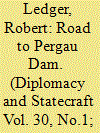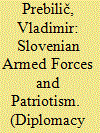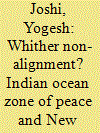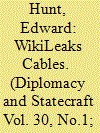|
|
|
Sort Order |
|
|
|
Items / Page
|
|
|
|
|
|
|
| Srl | Item |
| 1 |
ID:
164574


|
|
|
|
|
| Summary/Abstract |
In 1953, the Brazilian government decided to advance a plan for the demilitarisation and internationalisation of Jerusalem within a 50-kilometre radius. After consultations, the Holy See initially perceived the Brazilian initiative as agreeable. Also approached, the United States and Britain distrusted the plan, thinking they were dealing with a Papal overture. Israel suspected the Holy See to be behind the initiative and distrusted its intentions. For a few months, rumours stirred concern in the interested parties. After confusing mutual consultations, the Holy See did not really support the initiative and finally rejected and abandoned it. The fate of Brazil’s plan is relevant to understand the stalemate about the fate of Jerusalem, divided by Israel and Jordan, in the early years of the Cold War. Washington and London had already abandoned efforts to solve the issue through the United Nations but were unable to produce an alternative. Although attached to the prospect of internationalisation, the Holy See did not entertain the possibility of negotiating the city’s future. Brazil was making its initial foray into a more universalistic foreign policy and experimenting with different possible identities—Catholic, Western, peaceful—to substantiate its interest in making a broader contribution to international politics.
|
|
|
|
|
|
|
|
|
|
|
|
|
|
|
|
| 2 |
ID:
164579


|
|
|
|
|
| Summary/Abstract |
This analysis considers the phenomenon of citizen diplomacy in European Union [EU]–China relations. It begins by engaging with the global discourse about “new” diplomacy and outlines how society-centric citizen diplomacy differs from state-centric public diplomacy. After revealing that European policy-makers are only reluctantly acknowledging the role of laymen in foreign policy-making vis-à-vis China, it shows that whilst citizen diplomacy may be a new concept in EU–China relations, it is actually not a new practice. The empirical part of the exegesis traces the experiential learning amongst 12 European citizen diplomats who have engaged China in the activity fields of disability; psychoanalysis; non-governmental organisation twinning; human rights; climate change mitigation; welfare of orphans, abandoned disabled children and young people; youth dialogue; public participation; animal welfare; and inclusive performing arts. The final part makes use of the newly developed hexagon of intercultural communication and collaboration competence to reveal how the European citizen diplomats have managed to navigate the sometimes-treacherous political-administrative landscape in mainland China. European citizen diplomats have made manifold and often surprising contributions to China’s multifaceted development.
|
|
|
|
|
|
|
|
|
|
|
|
|
|
|
|
| 3 |
ID:
164576


|
|
|
|
|
| Summary/Abstract |
This analysis charts the changes in British aid policy under the Margaret Thatcher government (1979–1990). In particular, it examines the impact of so-called neo-liberal ideology in overseas development strategy in an era where “structural adjustment”—aid in return for market-based reforms—became World Bank and International Monetary Fund orthodoxy. There is some evidence to show British increases in multilateral aid during the 1980s supported a neo-liberal aid policy. Bilateral aid policy, however, demonstrated a subordination of aid to foreign policy and a pro-business—not ideologically pro-market or neo-liberal—alignment. One of the results of these structural changes was the Pergau Dam scandal at the end of the Thatcher years.
|
|
|
|
|
|
|
|
|
|
|
|
|
|
|
|
| 4 |
ID:
164578


|
|
|
|
|
| Summary/Abstract |
Patriotism needs understanding as a positive feeling that in its narrowest sense determines the relationship towards one’s country as basic living space of family members and, at the same time, represents the foundation for a variety of actions by individuals. A high level of patriotism amongst members of a state’s security system who are consequently providers of national safety is to be expected, and the members of the armed forces have perhaps the highest level of patriotism. Since its beginnings in June 1991, the Slovenian Armed Forces have been going through various reform processes and transformations. These developments have included changes in staffing the armed forces and a simultaneous constant reduction of the defence budget, both of which undoubtedly affect the satisfaction of each service member about their attitude towards the motherland and the system to which the service belongs. This analysis offers the results of a study of the members of the Slovenian Armed Forces that, first, identifies the level of patriotism amongst those members and, second, establishes their attitudes towards patriotism.
|
|
|
|
|
|
|
|
|
|
|
|
|
|
|
|
| 5 |
ID:
164581


|
|
|
|
|
| Summary/Abstract |
The United Nations [UN] came into being following the Second World War. Resembling earlier efforts of co-operation by the most powerful states of the international system, it was an attempt to effect global governance through the maintenance of international peace and security amongst states. However, led by its main executive organ, the Security Council, the UN has been unable to prevent and effectively deal with armed conflicts and mass atrocities in a number of situations. Over the years, the inability of the UN Security Council to take collective action has resulted in its ineffectiveness in dealing with war and humanitarian crises. This situation has led to calls for Security Council reform and has generated several initiatives to that end. This analysis discusses major shortcomings of the Security Council, analyses prominent reform initiatives, and introduces a proposal, the “Two-Layered Regional Model,” for Security Council reform.
|
|
|
|
|
|
|
|
|
|
|
|
|
|
|
|
| 6 |
ID:
164575


|
|
|
|
|
| Summary/Abstract |
First proposed in 1964 by the Sri Lankan prime minister, the Indian Ocean Zone of Peace [IOZP] entailed eradication of foreign military bases from the Indian Ocean region as well its denuclearisation. During the Cold War, India was one of the most vehement supporters of IOZP. If some saw India’s interests in the IOZP as another manifestation of Nehruvian idealism, others viewed it as a part of its non-aligned foreign policy. This analysis argues otherwise. India’s record on IOZP reveals a policy of selective alignment with Great Powers and its adaptation to the principles of power politics in international relations. India’s support for the presence of one or the other Great Powers in the Indian Ocean region found premise on balancing those it considered hostile to its national security interests. In public, India supported the call for IOZP as dictated by its non-aligned foreign policy; privately, New Delhi remained highly sceptical and often worked to IZOP’s detriment. Under the cloak of IOZP, India not only pursued diplomatic alignment with Great Powers but also ensured that its own regional ambitions remain unchecked. In this picture, India’s role was not only supportive of the Cold War but to the extent it could use the opportunities provided by superpower rivalry in the region to further its own ends, even determinative of the process.
|
|
|
|
|
|
|
|
|
|
|
|
|
|
|
|
| 7 |
ID:
164577


|
|
|
|
|
| Summary/Abstract |
The disclosure of more than 250,000 American diplomatic cables by the dissident media organisation WikiLeaks in 2010–2011 gained much attention in the American mass media but generated little interest for diplomatic historians. A small number of scholars explored small parts of the archive, but diplomatic historians and political scientists largely dismissed the cables as insignificant source material. These scholars overlooked important primary sources. The cables provide important revelations about American actions in every region of the world, especially between 2001 and 2010. Although United States officials and their supporters in the American mass media insisted that the cables showed American diplomats performing admirable work, the cables reveal how the United States exploits the world.
|
|
|
|
|
|
|
|
|
|
|
|
|
|
|
|
| 8 |
ID:
164580


|
|
|
|
|
| Summary/Abstract |
A hallmark of the Barack Obama Administration’s foreign policy was the incorporation of Lesbian, Gay, Bisexual, and Transgender and Intersex [LGBTI] rights diplomacy. With the change to the Donald Trump Administration in January 2017, this new aspect of American foreign policy has yet to be tested. This analysis investigates the methods used by advocates and government allies to imbed this policy in foreign policy institutions to increase the difficulty of a full policy reversal. It argues that whilst new leadership does not always support LGBTI equality domestically, LGBTI diplomacy will not likely face eradication from foreign policy mandates largely due to the strategic framing of LGBTI rights diplomacy.
|
|
|
|
|
|
|
|
|
|
|
|
|
|
|
|
|
|
|
|
|